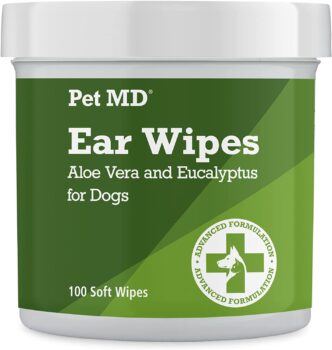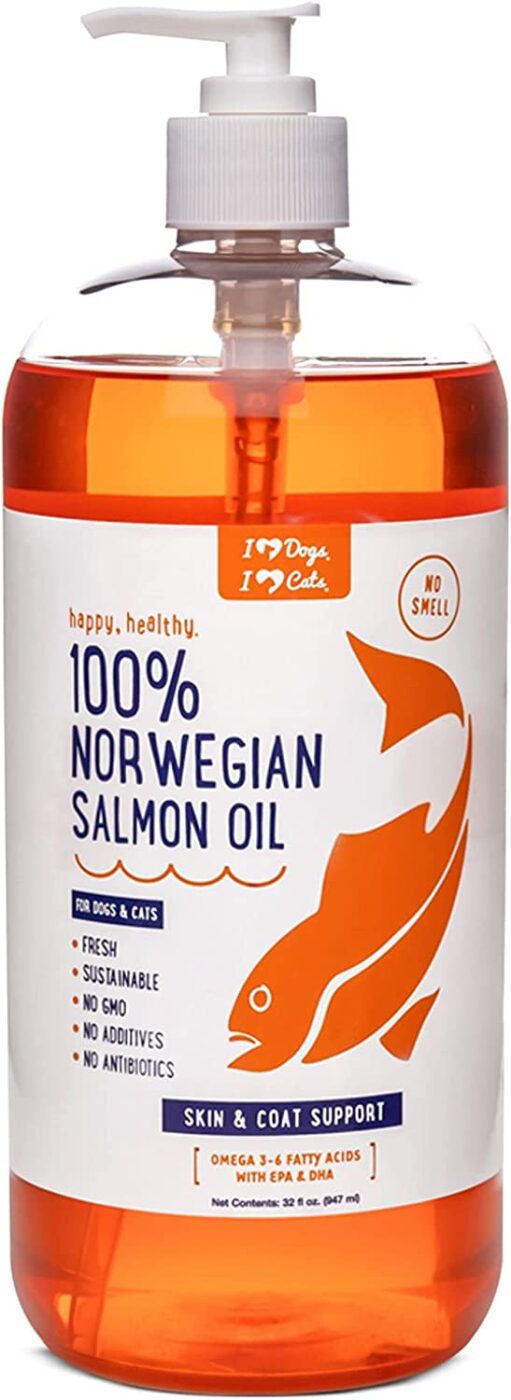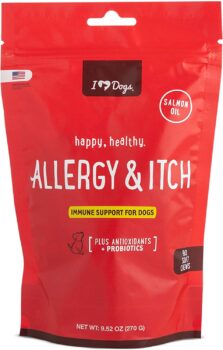Boston Terriers, with their charming tuxedo-like coats, expressive eyes, and friendly demeanors, often win our hearts. However, their compact size and unique features make them prone to specific health issues, including ear infections. This article explores eleven ways to treat and prevent ear infections in Boston Terriers, focusing on various strategies, including the benefits of Omega-3 in their diet to combat allergies.
iHeartDogs is reader supported. Some of the links below may be paid affiliate links, where we receive a small commission on a product at no additional cost to you.
1. Regular Cleaning
Regular ear cleaning is one of the most effective ways to prevent ear infections. Boston Terriers’ ears are susceptible to accumulating debris and wax, which can lead to infections. Clean your dog’s ears using a gentle dog-specific ear cleaner, and always make sure the ear is dry afterward to prevent moisture buildup.
Our favorite ear cleaner is these PetMD brand ear wipes on Amazon.
2. Veterinarian Checks
Regular vet checks can help identify potential issues before they escalate into infections. Your vet will check for redness, swelling, or any signs of discomfort that might indicate an underlying issue.
3. Treat Allergies Promptly
Many Boston Terriers suffer from allergies, which can lead to ear infections if not managed properly. Seasonal allergens, food, and dust mites are common culprits. If your terrier shows signs of an allergic reaction, seek veterinary advice immediately.
4. Anti-Parasitic Treatments
Parasites like ear mites can cause infections. Regular anti-parasitic treatments can help keep these pests at bay and your dog’s ears healthy.
5. Healthy Diet
A balanced, nutritious diet plays a significant role in your Boston Terrier’s overall health, including their ears. Feed them high-quality dog food that supports their immune system.
6. Omega-3 Supplements
Omega-3 fatty acids are beneficial for dogs suffering from allergies. These essential fats, often found in fish oil, can reduce inflammation and improve skin health, thereby helping to ward off ear infections. Ask your vet about suitable Omega-3 supplements for your Boston Terrier.
We’re fans of this Norwegian salmon oil on Amazon. It’s a bright orangish-pink color and has no fishy smell at all due to it’s ultra-high purity.
7. Avoidance of Water in Ears
Avoid getting water in your dog’s ears during baths or swims, as this can lead to infections. If they do get wet, dry them thoroughly.
8. Regular Exercise
Regular exercise can boost your dog’s immune system, making them less prone to infections. A fit Boston Terrier is a healthy Boston Terrier!
9. Minimize Exposure to Allergens
Where possible, minimize your Boston Terrier’s exposure to allergens. This could mean keeping them indoors during high pollen seasons or switching to hypoallergenic bedding.
A few good supplements to help your dog’s allergies are apple cider vinegar, quercetin, and colostrum, all of which are found in many natural allergy supplements like this one.
10. Vaccinations
Vaccinations can help prevent certain types of ear infections. Consult your vet about the best vaccination schedule for your dog.
11. Prompt Treatment
If you notice signs of an ear infection, such as head shaking, scratching, or an unpleasant odor, seek immediate veterinary attention. Prompt treatment can prevent complications and speed up recovery.
FAQ Section
Q1: What are the common symptoms of an ear infection in Boston Terriers? A1: Common symptoms include shaking the head, scratching at the ear, redness or swelling in the ear canal, and an unpleasant odor.
Q2: How often should I clean my Boston Terrier’s ears? A2: You should clean your dog’s ears at least once a week. However, some may need more frequent cleaning if they are prone to infections.
Q3: What causes ear infections in Boston Terriers? A3: Ear infections can be caused by many factors, including allergens, bacteria, yeast, ear mites, and excessive moisture.
Q4: Can Omega-3 help treat my dog’s ear infection? A4: Omega-3 can help reduce inflammation associated with allergies, a common cause of ear infections. However, it won’t directly treat an active infection.
Q5: Can ear infections in Boston Terriers be prevented? A5: While it’s impossible to prevent all ear infections, regular ear cleaning, good hygiene, a balanced diet, and addressing allergies promptly can significantly reduce the risk.
Q6: Can ear infections in Boston Terriers lead to serious complications? A6: If left untreated, ear infections can lead to more serious conditions, such as chronic ear disease or hearing loss.
Q7: Can a change in diet help prevent ear infections? A7: Yes, a balanced diet, including Omega-3 supplements, can support overall health and boost the immune system, reducing the risk of ear infections.
Q8: Are Boston Terriers more prone to ear infections than other breeds? A8: Boston Terriers are more prone to certain types of ear infections due to their unique ear structure and their predisposition to allergies.
Q9: How are ear infections in Boston Terriers treated? A9: Treatment usually involves a combination of professional cleaning, antibiotics, or antifungal medication, and in severe cases, surgery may be required.
Q10: Can home remedies cure my Boston Terrier’s ear infection? A10: Home remedies may help with minor issues, but any suspected ear infection should always be evaluated by a vet to prevent complications and ensure appropriate treatment.
In conclusion, Boston Terriers are adorable companions deserving of our utmost care. By understanding how to treat and prevent ear infections, we can ensure our furry friends stay happy and healthy. Remember, Omega-3 is a crucial part of their diet, combating allergies and reducing the risk of infections. As always, consult your vet regularly for the best preventative measures and treatments.




 Toledo, United States.
Toledo, United States.